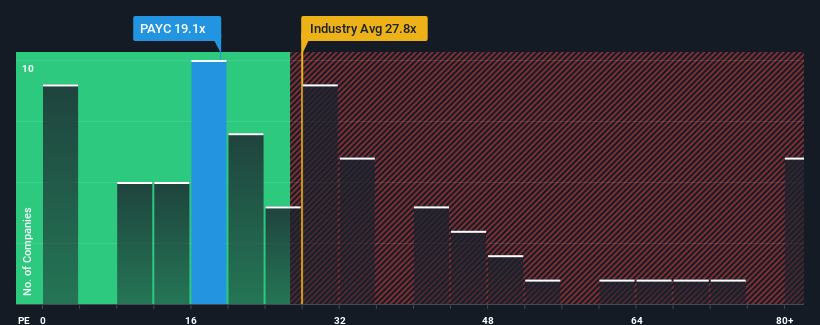- United States
- /
- Professional Services
- /
- NYSE:PAYC
Some Shareholders Feeling Restless Over Paycom Software, Inc.'s (NYSE:PAYC) P/E Ratio

It's not a stretch to say that Paycom Software, Inc.'s (NYSE:PAYC) price-to-earnings (or "P/E") ratio of 19.1x right now seems quite "middle-of-the-road" compared to the market in the United States, where the median P/E ratio is around 18x. While this might not raise any eyebrows, if the P/E ratio is not justified investors could be missing out on a potential opportunity or ignoring looming disappointment.
With its earnings growth in positive territory compared to the declining earnings of most other companies, Paycom Software has been doing quite well of late. It might be that many expect the strong earnings performance to deteriorate like the rest, which has kept the P/E from rising. If not, then existing shareholders have reason to be feeling optimistic about the future direction of the share price.
See our latest analysis for Paycom Software

How Is Paycom Software's Growth Trending?
In order to justify its P/E ratio, Paycom Software would need to produce growth that's similar to the market.
If we review the last year of earnings growth, the company posted a terrific increase of 52%. The latest three year period has also seen an excellent 189% overall rise in EPS, aided by its short-term performance. Accordingly, shareholders would have probably welcomed those medium-term rates of earnings growth.
Shifting to the future, estimates from the analysts covering the company suggest earnings should grow by 4.8% per year over the next three years. That's shaping up to be materially lower than the 10% per year growth forecast for the broader market.
In light of this, it's curious that Paycom Software's P/E sits in line with the majority of other companies. It seems most investors are ignoring the fairly limited growth expectations and are willing to pay up for exposure to the stock. Maintaining these prices will be difficult to achieve as this level of earnings growth is likely to weigh down the shares eventually.
The Final Word
Using the price-to-earnings ratio alone to determine if you should sell your stock isn't sensible, however it can be a practical guide to the company's future prospects.
We've established that Paycom Software currently trades on a higher than expected P/E since its forecast growth is lower than the wider market. When we see a weak earnings outlook with slower than market growth, we suspect the share price is at risk of declining, sending the moderate P/E lower. This places shareholders' investments at risk and potential investors in danger of paying an unnecessary premium.
Before you take the next step, you should know about the 1 warning sign for Paycom Software that we have uncovered.
If these risks are making you reconsider your opinion on Paycom Software, explore our interactive list of high quality stocks to get an idea of what else is out there.
New: Manage All Your Stock Portfolios in One Place
We've created the ultimate portfolio companion for stock investors, and it's free.
• Connect an unlimited number of Portfolios and see your total in one currency
• Be alerted to new Warning Signs or Risks via email or mobile
• Track the Fair Value of your stocks
Have feedback on this article? Concerned about the content? Get in touch with us directly. Alternatively, email editorial-team (at) simplywallst.com.
This article by Simply Wall St is general in nature. We provide commentary based on historical data and analyst forecasts only using an unbiased methodology and our articles are not intended to be financial advice. It does not constitute a recommendation to buy or sell any stock, and does not take account of your objectives, or your financial situation. We aim to bring you long-term focused analysis driven by fundamental data. Note that our analysis may not factor in the latest price-sensitive company announcements or qualitative material. Simply Wall St has no position in any stocks mentioned.
About NYSE:PAYC
Paycom Software
Provides cloud-based human capital management (HCM) solution delivered as software-as-a-service for small to mid-sized companies in the United States.
Flawless balance sheet with limited growth.
Similar Companies
Market Insights
Community Narratives



